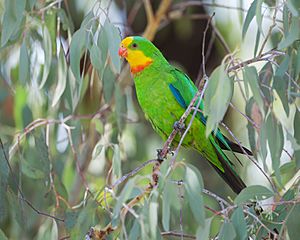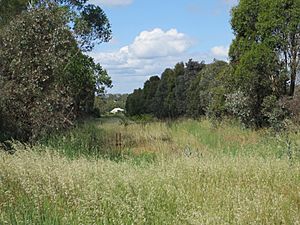Superb parrot facts for kids
Quick facts for kids Superb parrot |
|
|---|---|
 |
|
| Adult male in Canberra, Australia | |
| Conservation status | |
| Scientific classification |
|
| Kingdom: | Animalia |
| Phylum: | Chordata |
| Class: | Aves |
| Order: | Psittaciformes |
| Family: | Psittaculidae |
| Genus: | Polytelis |
| Species: |
P. swainsonii
|
| Binomial name | |
| Polytelis swainsonii (Desmarest, 1826)
|
|
| Script error: The function "autoWithCaption" does not exist. | |
Script error: No such module "Check for conflicting parameters".
The superb parrot (Polytelis swainsonii) is a beautiful bird from south-eastern Australia. It is also known as Barraband's parrot or green leek parrot. This parrot is special because males and females look different, which is called sexual dimorphism. It is one of three types of parrots in the Polytelis group.
Superb parrots are mostly bright green. Their flight feathers are a bit darker. They grow to about 40 cm (16 inches) long and have a long, pointed tail. Adult male superb parrots have bright yellow on their foreheads and throats. They also have a red stripe across their throat.
Contents
About the Superb Parrot
The superb parrot is a medium-sized, bright green bird. It has long tail feathers and yellow-orange eyes. Its neck is yellow-green.
How Males and Females Look Different
Adult male superb parrots have a bright yellow face and throat. They also have a scarlet (bright red) band on their upper chest.
Adult female superb parrots look a bit different. They have a pale blue-green face and a greyish-green throat. Their fore-throat might have some russet-pink color. Their thighs are orange.
Young superb parrots have brown eyes. They look similar to the adult females. Male parrots get their adult colors when they are about one year old.
Where Superb Parrots Live
The superb parrot lives only in Australia. It can be found in the dry woodlands of New South Wales and Victoria. Scientists believe there are at least 10,000 superb parrots living in the wild.
Important Bird Areas for Superb Parrots
Some places are very important for protecting superb parrots. These areas are identified by BirdLife International. They include:
- Barmah-Millewa
- Murrumbidgee Red Gums
- South-west Slopes of NSW
Superb Parrot Behavior
Superb parrots build their nests in hollow tree limbs or holes in trees. During the time they are raising their young, small groups of male parrots often search for food by themselves. Sometimes, several pairs of parrots will nest close to each other, forming a small group of up to six pairs. This means the females are also close by.
What Superb Parrots Eat
The superb parrot's diet mainly includes flowers, fruits, nectar, and pollen from eucalypt trees. They also eat seeds and green parts of the Yellow Box tree (Eucalyptus melliodora).
Protecting Superb Parrots
Superb parrots face challenges, mainly due to losing their homes (habitat) in Australia.
Conservation Status
The superb parrot was once listed as a Vulnerable species on the IUCN Red List of Threatened Species. This meant it was at risk of becoming endangered. However, in 2012, its status was changed to Least Concern. This is good news, but it still means we need to protect them. The parrot is also listed on Appendix II of CITES, which helps control trade of the species.
In Australia, superb parrots are listed as vulnerable under the Australian Environment Protection and Biodiversity Conservation Act 1999. Their protection status can also change from state to state. For example, in Victoria, they are listed as threatened under the Flora and Fauna Guarantee Act (1988). This Act helps create plans to help the species recover.
Threats to Superb Parrots
Superb parrots face threats that can harm their populations.
- Habitat Loss: In 2005, logging in the Barmah State Forest destroyed many nesting areas. This was a big problem, especially since fewer than 150 superb parrots were breeding in Victoria at that time.
- Road Accidents: In 2008, many superb parrots were hit by cars. Wildlife officials thought the parrots might have eaten spilled grain from trucks. This could have made them too full to move quickly, leading to accidents.
Images for kids
See also
 In Spanish: Perico soberbio para niños
In Spanish: Perico soberbio para niños
 | John T. Biggers |
 | Thomas Blackshear |
 | Mark Bradford |
 | Beverly Buchanan |






